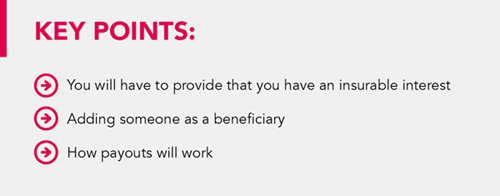
Taking out life insurance on behalf of someone- be it a sibling, a parent or an extended family member is a common request that insurers receive.
While it may be possible for you to take out a policy on behalf of someone, there are a few things to keep in mind that can impact your ability to do this. We break down the process of how you can cover a loved one.

What is insurable interest and how it will affect your policy?
If you are taking out cover for your husband, for instance, the husband is the ‘life assured.' There has to be a sound reason for covering the life assured, so you have to demonstrate that should the life assured pass away, you would suffer financial consequences or losses.
Other common instances include people taking out life cover on business partners, ex-partners who pay child maintenance, or even key employees from time to time.
Just being close family members does not entitle you to take out life cover on another person, however. The key is still that you have an insurable interest and would suffer a financial loss or hardship if the life assured passed away. For instance, if your parents or grandparents no longer support you financially in any way, you would not be able to take out life cover on them.
Why do insurers require insurable interest?
Life insurance is an important policy that means that you will be financially protecting your life and the lives of your loved ones should something happen to you.
However, if anyone could simply take out cover on someone else the risk would be very high for insurers and policyholders. It also prevents situations where people end up intentionally killing the policyholder or committing fraud to receive the payout.
Insurable interest is put in place to help protect everyone involved and avoid situations where people would like to benefit through fraudulent means.


Adding someone as a beneficiary
Adding a beneficiary is the next crucial step. A beneficiary is someone who you would like to choose to receive the payout from your life cover. You can take out a policy on behalf of someone, but it does not necessarily mean you will be receiving the payout.
You may choose to pay for the life cover of a loved one, but they still have the choice of choosing who their beneficiaries are. This theoretically means that they can choose not to have you as a beneficiary if they wanted.Not having any beneficiaries or an updated beneficiary list can cause the payout to remain unclaimed for years.
How will payouts work?
Make sure that the beneficiary list is kept up to date by reviewing your policy annually or when a major life event happens such as getting married or one of your beneficiaries passing away. It will ensure that the right people receive the payout.
When it comes to the claim stage you will need the relevant claim documents that are needed by your insurer to process the claim. You can find this information on your insurer's website under claims or a policy document. Always remember to read and understand the exclusions that come with a policy as this can have an impact on the claims stage.